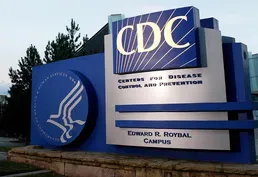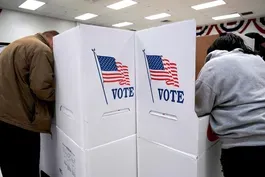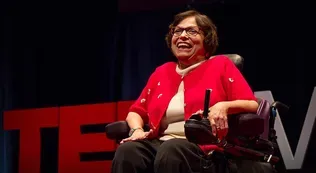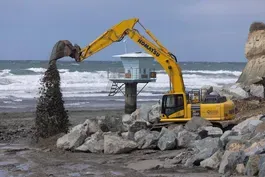
Iran's future on the world stage increasingly uncertain
Clip: 3/6/2023 | 8m 49sVideo has Closed Captions
Iran's future on the world stage uncertain amid continuing protests, nuclear enrichment
Iran’s supreme leader on Monday called still-unexplained cases of sickness among Iranian girls “an unforgivable crime," after more than 1,000 girls recently fell ill in schools across Iran. This occurred as the regime cracked down on national protests and as Iran accelerated its nuclear program. Behnam Ben Taleblu of the Foundation for Defense of Democracies joins Nick Schifrin to discuss.
Problems with Closed Captions? Closed Captioning Feedback
Problems with Closed Captions? Closed Captioning Feedback
Major corporate funding for the PBS News Hour is provided by BDO, BNSF, Consumer Cellular, American Cruise Lines, and Raymond James. Funding for the PBS NewsHour Weekend is provided by...

Iran's future on the world stage increasingly uncertain
Clip: 3/6/2023 | 8m 49sVideo has Closed Captions
Iran’s supreme leader on Monday called still-unexplained cases of sickness among Iranian girls “an unforgivable crime," after more than 1,000 girls recently fell ill in schools across Iran. This occurred as the regime cracked down on national protests and as Iran accelerated its nuclear program. Behnam Ben Taleblu of the Foundation for Defense of Democracies joins Nick Schifrin to discuss.
Problems with Closed Captions? Closed Captioning Feedback
How to Watch PBS News Hour
PBS News Hour is available to stream on pbs.org and the free PBS App, available on iPhone, Apple TV, Android TV, Android smartphones, Amazon Fire TV, Amazon Fire Tablet, Roku, Samsung Smart TV, and Vizio.
Providing Support for PBS.org
Learn Moreabout PBS online sponsorshipGEOFF BENNETT: Today, Iran's supreme leader called still unexplained cases of sickness among Iranian schoolgirls an unforgivable crime.
Iranian authorities say, in the last three months, more than 1,000 girls have fallen ill in more than 100 schools.
The incidents occurred as the regime cracked down on national protests and as Iran further accelerated its nuclear program.
Nick Schifrin begins with the cases of mysterious illness across that country.
NICK SCHIFRIN: They go to study, and end up sick, Iranian schoolgirls, gasping for air, some, their symptoms so serious, taken away by ambulance.
"We don't want to die," they shout.
In dozens of schools across the country, there has been chaos and fear.
And hospitals near the schools are packed with young girls struggling with breathlessness and nausea.
In most cases, students complained of a foul smell, then fell ill. STUDENT (through translator): It was P.E.
class.
When we went to the hall, we smelled something like perfume.
STUDENT (through translator): I have severe numbness.
I can't walk at all.
WOMAN (through translator): The students all felt the same symptoms as me.
They had coughs.
Some of them said their eyes burned.
NICK SCHIFRIN: The first suspected incident was reported in November in the holy city of Qom south of Tehran.
Now Iranian officials admit suspected cases have spread to more than 20 of Iran's 31 provinces.
Angry parents are taking to the streets in videos blurred to protect them from government retribution, this protest outside the Department of Education in Tehran.
"The next to be poisoned will be yours," they chant.
It's still unknown who or what is responsible.
The Iranian regime launched an investigation, but has made no arrests or conclusions.
Today, Iranian Supreme Leader Ali Khamenei broke his silence, saying those responsible would receive the death penalty.
AYATOLLAH ALI KHAMENEI, Supreme Leader of Iran (through translator): If there truly is vandalism and there are individuals or groups behind this matter, this is a great and unforgivable crime.
The culprits must face the toughest of punishments, because this is not a small crime.
This is a crime against the most innocent part of society, meaning children.
NICK SCHIFRIN: But the regime has targeted innocent children and thousands of demonstrators.
Last year, Iranians launched their most widespread protests in more than a decade.
They were led by women, many of them teenagers.
The regime responded with force.
Human rights organizations accuse authorities of using excessive force and killing hundreds of largely peaceful protesters, including dozens of children.
Authorities have also imprisoned hundreds more on what human rights groups call dubious charges and issued dozens of death sentences.
That has largely ended these demonstrations, but activists are calling for more protests tomorrow.
For more on human rights in Iran and recent steps that Iran has taken to advance its nuclear program, we turn to Behnam Ben Taleblu, a senior fellow at The Foundation for Defense of Democracies, a think tank in Washington.
Thanks very much.
Welcome to the "NewsHour."
Today, a National Security Council spokesperson told me that the U.S. is calling for a -- quote - - "credible, independent, outside Iran, investigation into the schoolgirl incidents."
Is that the correct approach?
BEHNAM BEN TALEBLU, The Foundation for Defense of Democracies: Pleasure to be with you, Nick.
It is indeed the correct approach.
As you know, there has been about 1,000 of these reported cases of schoolgirl poisonings across Iran really since November, which is about two months after nationwide anti-regime protests led by women and indeed young girls began and indeed is bravely continuing.
The regime has been forced into by parent pressure, by social pressure, by street pressure into conducting an investigation.
Today, the country's supreme leader talked about those poisonings for the first time ever.
But it's highly likely that,if there is any investigation by the government of Iran, it may aim to avoid blame or point a finger elsewhere.
NICK SCHIFRIN: We will continue to focus on that story, but I want to switch you to another story, Iran's advancing nuclear program.
As you know, the IAEA, the U.N.'s nuclear watchdog, found on an unannounced visit to one of Iran's nuclear sites, enriched particles up to 84 percent.
Why is that significant?
BEHNAM BEN TALEBLU: You know, 84 percent is just the hop, skip and a jump away from 90 percent, which is the purity you need for weapons-grade uranium.
And many may remember, from about a decade ago, people were trying to stop Iran enriching to any level, 3 to 5 percent, even, on their own territory.
What the 2015 nuclear deal tried to lock in and cap was just under that 5 percent.
But, really, in the past two years, the regime has resumed enrichment to 20 percent purity, which is considered highly enriched, by the way.
And then, in April 2021, the month talks actually restarted indirectly with the Biden administration, the regime went to 60 percent purity, something it threatened to do a decade ago, but never felt comfortable doing until now; 84 percent is clearly the regime testing the red lines of the West, if you ask me, and perhaps even practicing for a potential future breakout scenario.
NICK SCHIFRIN: The IAEA head, Rafael Grossi, visited Tehran this past weekend, and he said in a press conference in Tehran that Iran would allow the restoration of IAEA cameras that Iran had removed and also work with the IAEA on previous cases.
But, today, Grossi, back in Vienna, said, actually, that cooperation will depend on future discussions.
So, how do you think the international community can hold Iran to its promises?
BEHNAM BEN TALEBLU: Well, the problem with the get-go, as the regime is increasing its nuclear output both qualitatively and quantitatively, it is actually diminishing much of the monitoring.
And, in fact, Rafael Grossi before the IAEA board today talked about that they still don't know where Iran is making centrifuge rotors and centrifuge bellows, as well as exact heavy water output, as well as several other technical components that go into the regime's nuclear program that were supposed to be monitored and were supposed to be governed by safeguards.
The moment after Grossi departs, you have had a host of Iranian hard-line media outlets and people affiliated with the hard-line establishment inside Iran talk about how the things Grossi had said were agreed upon were actually not true and walking it back.
So, it makes sense that Grossi said much of these hinge on Iranian political promises.
The challenges -- that's always been the challenge with the Islamic Republic.
It's always voluntary, and it's always political, which means the regime remains in the nuclear driver's seat.
NICK SCHIFRIN: When it comes to U.S. policy, the U.S. has a choice right now whether to censure Iran in front of the IAEA Board of.
And, overall, the U.S. has argued that it has taken steps to deter Iran and prevent further Iranian attacks, including one on Saudi Arabia.
Let's take a listen to the National Security Council staff's top official on the Middle East, Brett McGurk.
BRETT MCGURK, White House Coordinator For the Middle East and North Africa: In the last two years, the United States has acted militarily against threats from Iran and its proxies.
We have enhanced the deterrent capacity of our partners, established new and innovative maritime domain awareness that works and, at times, through close cooperation, exposed and deterred imminent threats to the region.
And, just last month in the Eastern Mediterranean, as many of you know, we held the largest joint military exercise ever in that part of the world, something that our adversaries certainly noticed.
NICK SCHIFRIN: Do you think Iran has gotten the message that Brett McGurk believes the U.S. has sent?
BEHNAM BEN TALEBLU: You know, all those things are necessary, but not sufficient from deterring Iran and from changing the regime's calculus.
The cadre of men at the helm today are ultra hard-line.
And the things that they remember are actually the U.S. withdrawal from Iraq, the U.S. withdrawal from Afghanistan, besting America in Syria in recent years, if you will, showing that the regime has greater staying power than the U.S. in the heartland of the Middle East, continuing to find new and innovative ways to proliferate weapons, not just the Middle East, but, as you have seen now, with heightening military ties between Russia and Iran, drone proliferation to the heart of Europe, even.
So, all those things are necessary, but not sufficient, to change the calculus on the nuclear file.
A resolution of censure is the price floor.
You need Security Council referral, and ultimately a snapping back or a restoration of tougher multilateral sanctions that used to exist prior to the 2015 nuclear deal.
That option is only legally and politically available to America and Europe until 2025.
And then it actually dissipates.
It goes away.
So if increasing military threats by the regime, increasing domestic suppression and increasing nuclear escalation are not sufficient to trigger that mechanism, my question for the administration is, well, what is?
NICK SCHIFRIN: Behnam Ben Taleblu, thank you very much.
BEHNAM BEN TALEBLU: Thank you.
CDC director on how the agency's addressing COVID shortfalls
Video has Closed Captions
Clip: 3/6/2023 | 7m 46s | CDC Director Dr. Rochelle Walensky discusses how the agency is addressing COVID shortfalls (7m 46s)
COVID disruptions at work lead to baby boom
Video has Closed Captions
Clip: 3/6/2023 | 8m 31s | COVID disruptions at work lead to baby boom (8m 31s)
GOP divisions become clearer as White House race takes shape
Video has Closed Captions
Clip: 3/6/2023 | 11m 6s | GOP divisions become clearer as field of candidates for White House begins to take shape (11m 6s)
Judy Heumann's lasting contributions to disability rights
Video has Closed Captions
Clip: 3/6/2023 | 3m 50s | Remembering Judy Heumann's lasting contributions to disability rights (3m 50s)
News Wrap: California residents reeling as storm approaches
Video has Closed Captions
Clip: 3/6/2023 | 5m 18s | News Wrap: California residents reeling as another winter storm approaches (5m 18s)
Providing Support for PBS.org
Learn Moreabout PBS online sponsorshipSupport for PBS provided by:
Major corporate funding for the PBS News Hour is provided by BDO, BNSF, Consumer Cellular, American Cruise Lines, and Raymond James. Funding for the PBS NewsHour Weekend is provided by...















